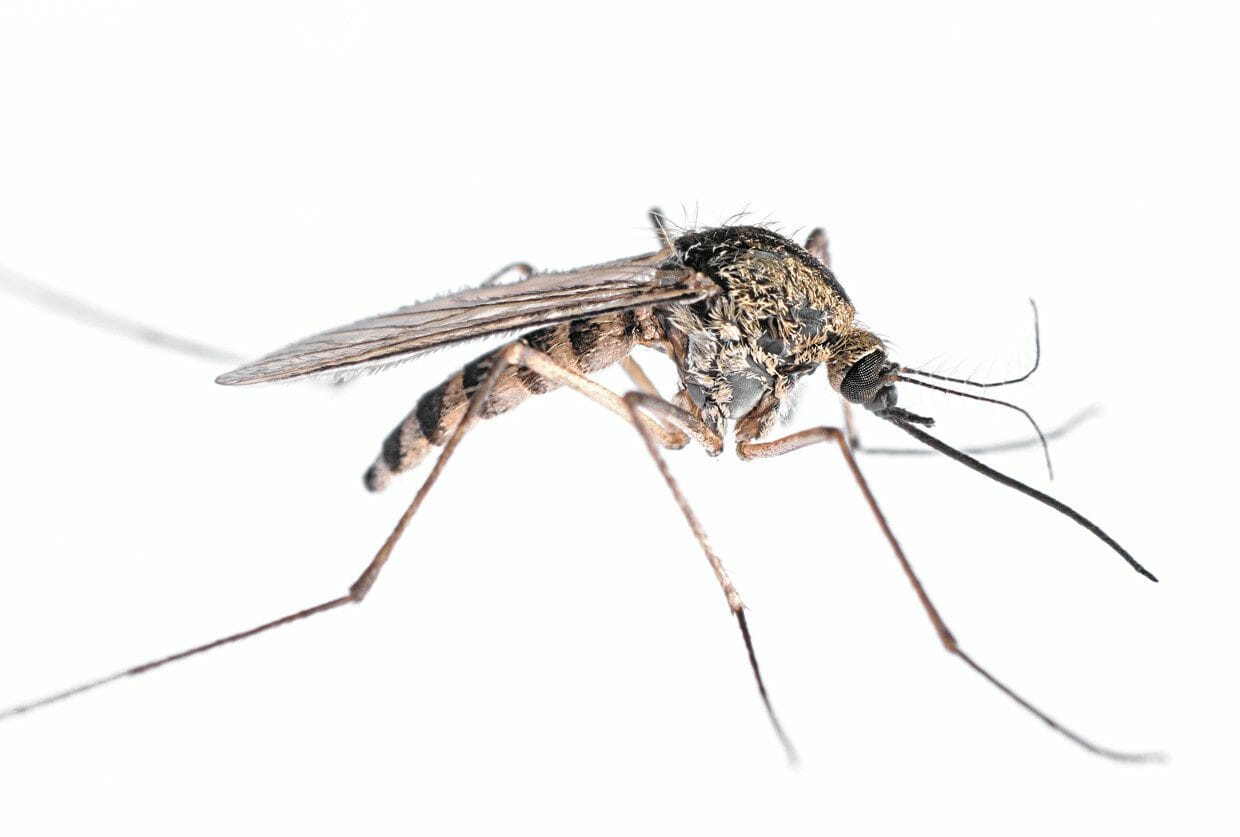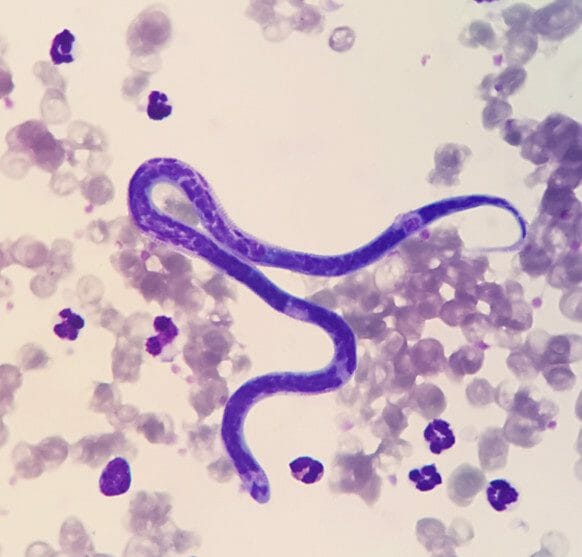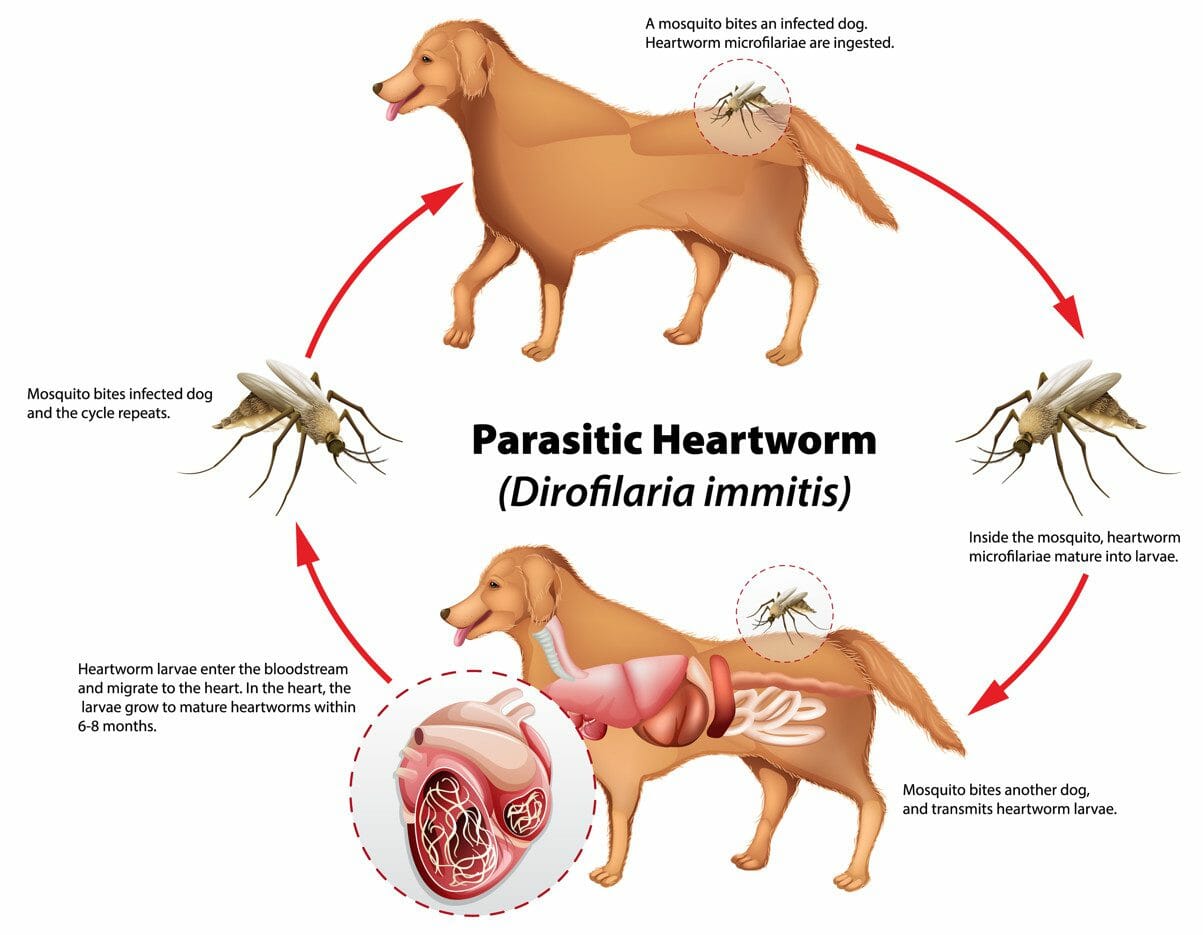Heartworm Treatment
According to the American Heartworm Society, there are more than 1 million dogs contending with this infection at any given time within the United States. What once began as an issue primarily seen on the East Coast or in the southern states of Alabama, Mississippi, and Florida is now an issue that all parts of the country are faced with.
Although there are effective heartworm treatments available for dogs already infected, the best form of protection against infection is preventative measures. Whether it be administered orally, topically, or injected, prevention is the key to protecting dogs from heartworm.
Beginning around 8 weeks old, veterinarians recommend that dogs should be given preventative medications on a routine basis. Depending on the dog’s weight, the vet will determine the appropriate dose. Prevention and treatment (if necessary) are life-saving for a dog dealing with this infection.

Heartworm Symptoms in Dogs
One of the trickiest aspects of heartworm disease is detecting it. After being infected by a mosquito with the disease, the worm has to go through an entire lifecycle before it can infiltrate various organs. This lifecycle process of the heartworm can take between 5 and 7 months to complete. Because of this, it may be up to half a year after being infected before a dog begins to exhibit diagnosable symptoms.
Even worse, some dogs do not show symptoms until the disease is quite advanced. These worms grow in size and number the longer they remain inside the dog. If left undetected, heartworms can remain viable in a dog for up to 7 years.
Signs of the Disease
The more heartworms are living in a dog, the more critical the situation. Because of this, there are classes to designate how advanced the infestation is, depending upon how many worms are involved.
- Class 1: Little to no symptoms.
- Class 2: The dog may grow more tired than usual after moderate exercise. A persistent cough may appear.
- Class 3: Noticeable fatigue may follow minimal exertion. Incessant coughing and breathing issues. Fainting can occur.
- Class 4: Life-threatening. Dark urine. Labored breathing. Decreased appetite and activity levels. Known as caval syndrome, this stage of the disease must be treated surgically if the dog is to have a chance at survival.

How Do Dogs Get Heartworm?
Infiltrating into the dog’s bloodstream via mosquito bite, heartworms go by the scientific name Dirofilaria immitis. Once the disease-carrying mosquito deposits some of the microfilariae (larva) into the dog’s blood, it can take a minimum of 5 months to develop fully and spread.
Before getting to the dog’s vital organs, the worms have to go through an entire lifecycle, from microfilariae to adult. Once they reach the adult stage, these parasites can reproduce and travel to the dog’s lungs, heart, or arteries. This can be life-threatening if treatment is not sought.
While inside a dog, heartworms can reach lengths between 6 to 12 inches. In extreme cases, close to 300 worms can be inhabiting a dog at once. In this situation, only surgical removal can dispose of them.
Are Heartworms Contagious to Other Animals?
No, these parasitic worms are not contagious to other animals. The only way to become infected with heartworms is by being bitten by a mosquito carrying the disease. Other than that, worm-infested animals should be adopted, loved, and cared for properly by those around it without fear of becoming infected.

Can Humans Get Heartworm?
As previously mentioned, this type of worm is not contagious. Therefore, neither animals nor humans can contract it from an infected dog. In spite of this, humans can become infected through the bite of a mosquito. This is very rare, however, considering these parasites are almost exclusive to animals. If a human does become infected, the worm usually does minimal damage due to its inability to grow into adulthood within a human.
Heartworm Prevention Methods
Without a doubt, the most surefire way of making sure a dog never contracts heartworms is through consistent prevention methods employed by the owner in tandem with a vet’s supervision. Because both puppies and adult dogs are equally likely to develop worms, it is highly recommended that prevention begins when the puppy gets to be about 7 or 8 weeks old.

Types of Prevention
Depending upon the recommendations of a board-certified veterinarian, the dog will either receive preventative medications orally, topically, or via an injection.
Medications ingested or rubbed into the skin will need to be administered monthly on a consistent basis. Oral medications should be given monthly as well. Even missing one month could put the dog at risk. As for medications to be injected, these are usually done once or twice per year by a vet.
Whatever method of treatment is decided upon by a vet, it should be closely adhered to indefinitely. Another good practice is to have a dog tested yearly for these worms. If annual testing is combined with consistent monthly doses of prescribed preventative medication, a dog should be well-protected against parasitic infestation.
Heartworm Medicine for Dogs
In spite of how the medication is administered, whatever is used to prevent these worms must be FDA-approved and vet-approved. This means all home remedies stand a chance of doing much more harm than good and should be avoided altogether.
Before any type of heartworm pills or topical medications can be used, a vet must be consulted to determine if it is safe for the dog. The vet will be able to evaluate the dog and ensure the specific medication is safe for it, given any preexisting medical conditions. It is also good to remember that the dosage will go by the dog’s weight, not its age.
According to Chewy, these are some of the best-reviewed heartworm treatment options available:
- Nexgard (Afoxolaner)
- Sentinel (Milbemycin Oxime, Lufenuron)
- Heartgard (Ivermectin)
- Trifexis (Spinosad)
As always, consult with the dog’s vet before administering medication. All reputable prevention methods will require a vet’s prescription.

Treatment for Advanced Cases
For advanced cases, the vet will most likely employ potent medications in an attempt to kill the worms in the bloodstream. If this is proving to be ineffective, surgery may be considered to physically remove all traces of the worms. This can be a complicated and dangerous operation, so this is normally used as a last resort.
Other parasites can also causes problems in dogs. For example, ticks on dogs can potentially lead to Lyme disease. Fleas can also cause canines to be uncomfortable.



